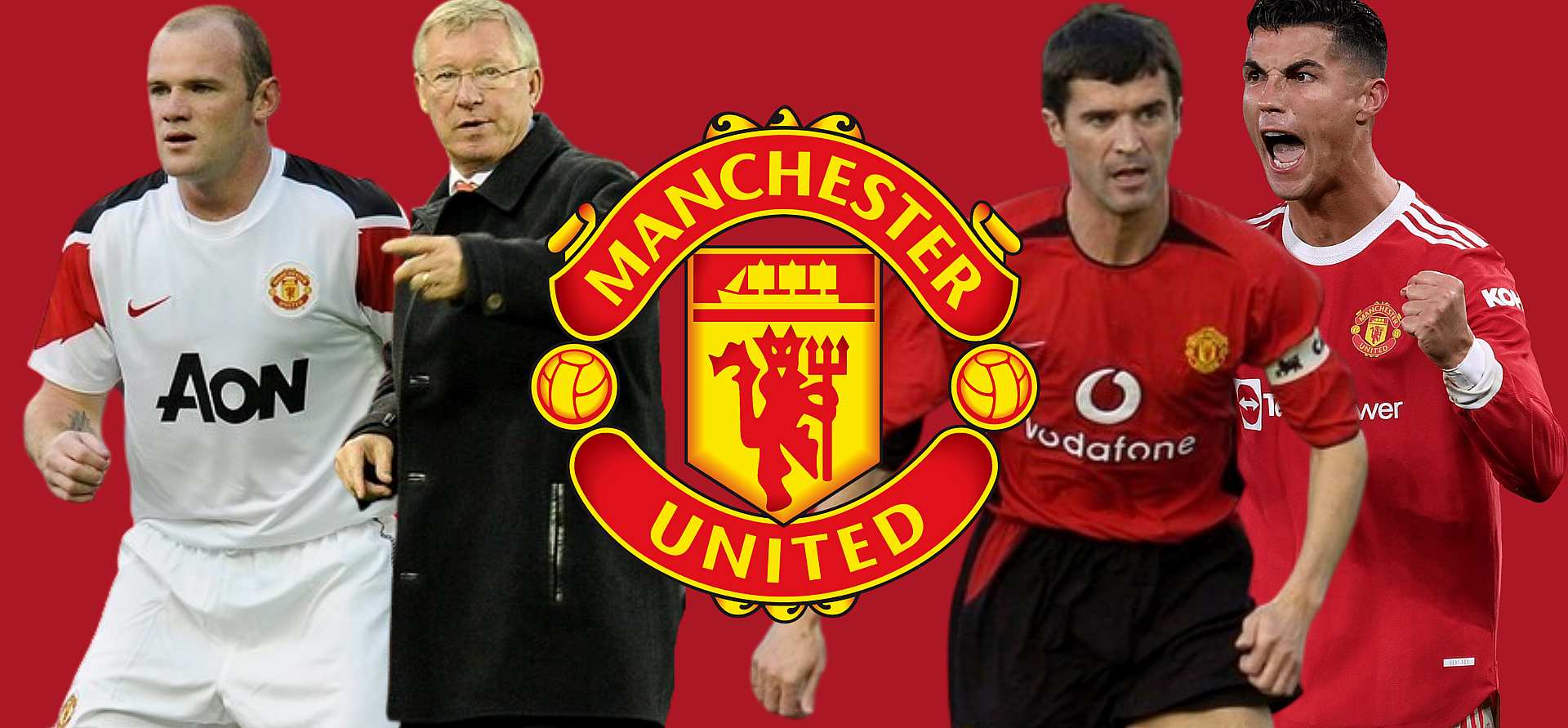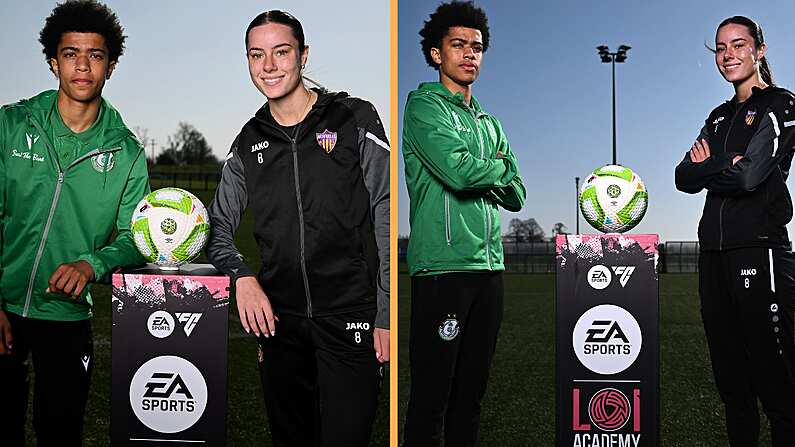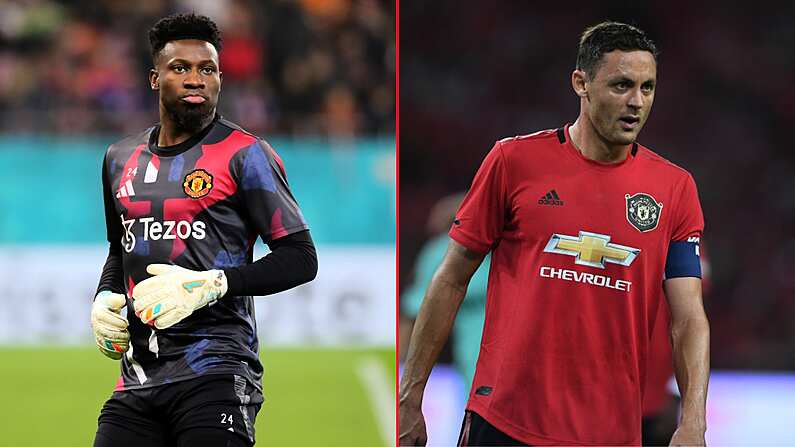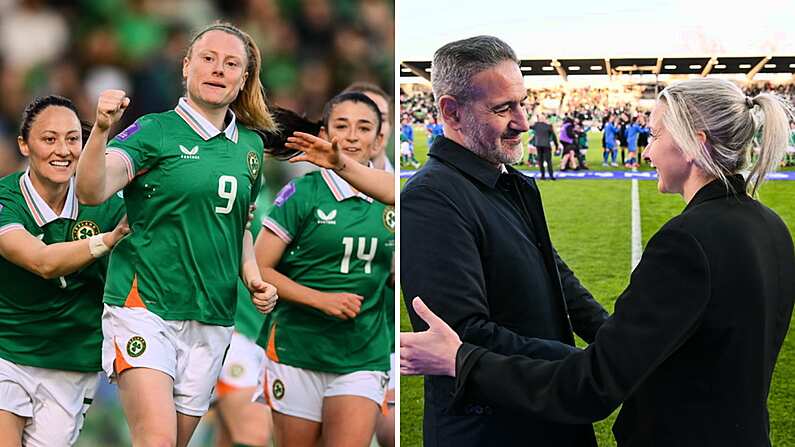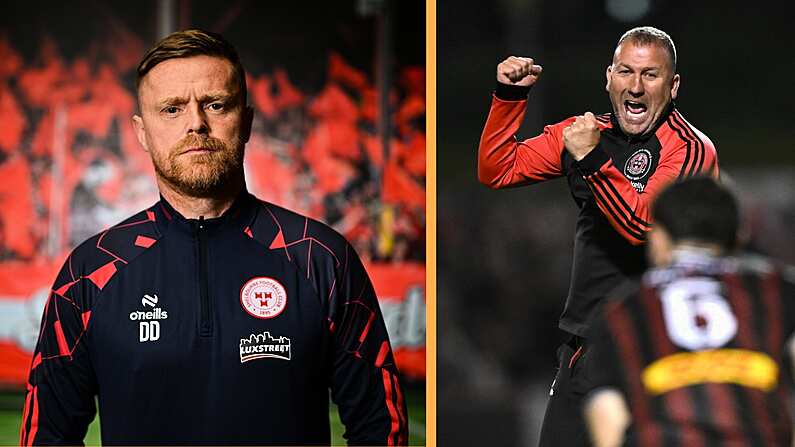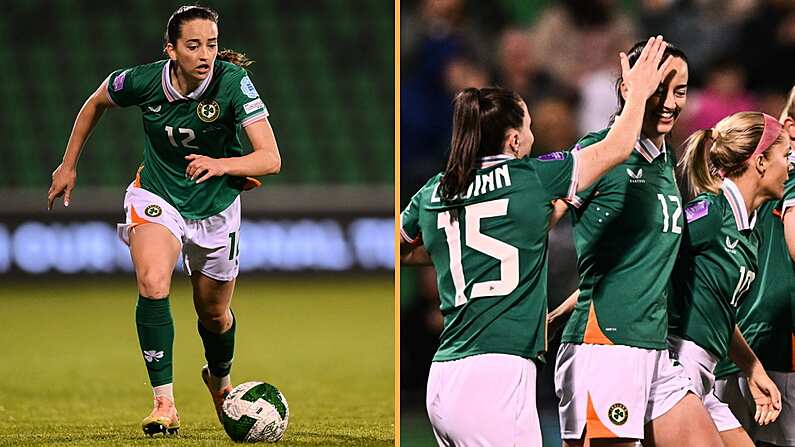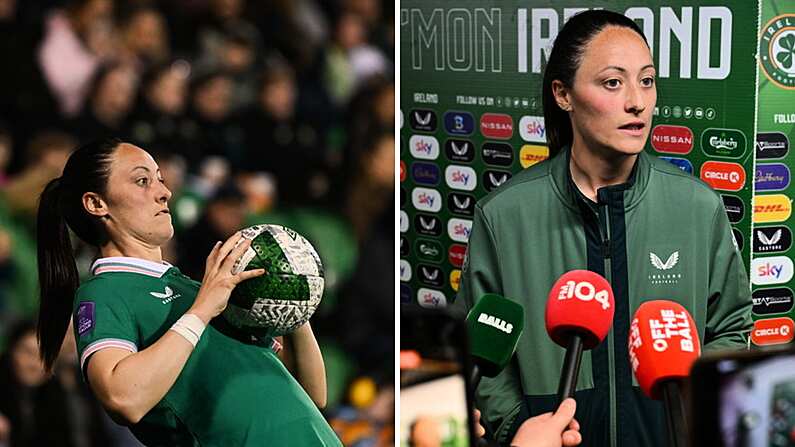Manchester United have a rich history, and many of their moments of glory have come in the 30 years since the First Division became the Premier League in 1992.
Countless greats have passed through Old Trafford in the Premier League era, many of them under the stewardship of Alex Ferguson in the first two decades of the Premier League.
The longest-serving Manchester United manager brought an incredible 13 Premier League titles during his 27 years in charge of the club, as well as two UEFA Champions League titles.
Things have taken a turn for United since the departure of Alex Ferguson as manager in 2013, however. A string of managers have attempted to turn around the fortunes of the club, but they now face a struggle to reach the lofty heights of the Ferguson era.
Read on below to get the comprehensive history of Manchester United in the Premier League era. The trophies, the failures, the players, the managers, the iconic goals - they're all here.
History of Manchester United: 1992-2022
Manchester United history: The early Premier League years
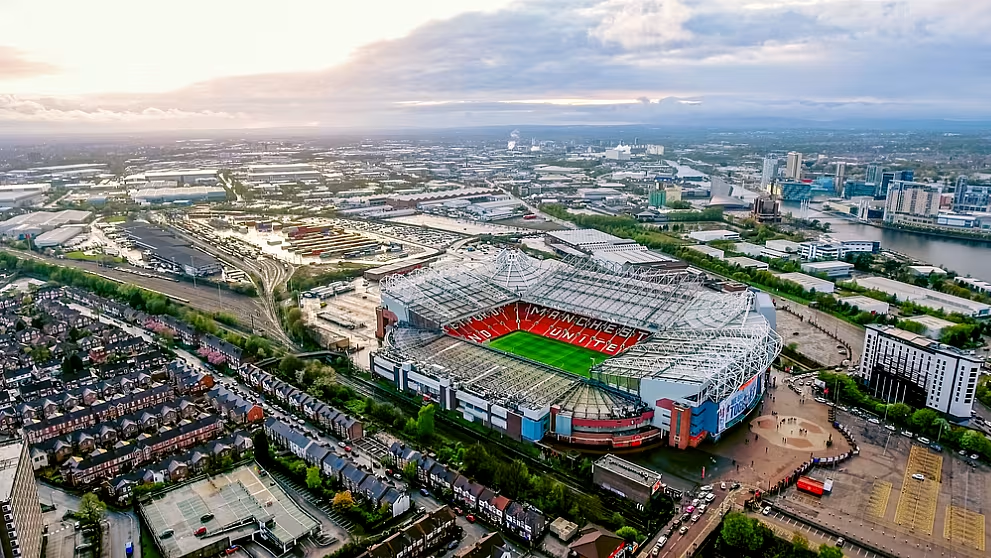
Manchester United's home stadium Old Trafford (Photo: Shutterstock)
Manchester United football club were one of the founding members of the Premier League when it came into existence in 1992. United were multiple champions of England, having won the Football League First Division title on seven occasions.
By the time the Premier League era of English football began, however, Manchester United had been waiting 26 years for a league title. 1966-67 was the last league title the club had won. The following season they had won the European Cup at Wembley, and the intervening period had brought four FA Cup titles and the European Cup Winners' Cup in 1991.
But, for the most part, the 1970s and '80s had brought disappointment for Manchester United. In 1986, the club parted ways with manager Ron Atkinson, and appointed Scottish coach Alex Ferguson to take the reins at Old Trafford.
In 1992, the Football League split, with the top clubs restructuring the First Division into a new competition known as the Premier League. The new format was to bring huge revenue streams for the biggest clubs through TV rights and, as English football entered a new era, Manchester United were on the verge of returning to the top of the domestic game.
They had finished runners up in the 1991-92 league title chase, and responded to losing out to Leeds by signing their standout player Eric Cantona in the winter of 1992.
The move for Cantona was an impromptu one from Alex Ferguson. Leeds had made a call to the Manchester United executives to enquire about the availability of Irish full-back Denis Irwin. By chance, Ferguson was present in the room and rejected the move for Irwin - but took a chance on asking about Cantona's availability. The rest, as they say, is history.
The deal to sign Cantona cost United £1m (approximately £2m in today's money), a deal of incredible value given how crucial he would become to the club's success in the 1990s. Holding on to Denis Irwin was also good business, as he would play a similarly pivotal role in the team.
The first season of the Premier League saw Manchester United claim their first title in 26 years. Cantona contributed nine goals, as United saw off challenges from Aston Villa in second and Norwich City in third to win their eighth league title.
The turning point came in a home game against Sheffield Wednesday in early April. Trailing 1-0 as the clock ticked past 90 minutes, two stoppage time headers from captain Steve Bruce sealed a dramatic comeback win - and led to the iconic phrase "Fergie time" entering the English football lexicon.
The backbone of the first great Alex Ferguson Manchester United team had been built in that first season of English football's new era. There was to be another crucial addition in the summer of 1993, as Cork man Roy Keane joined for a then-British record transfer fee of £3.75m.
Keane would be the long-term replacement for club legend Bryan Robson, who had his final season with Manchester United in 1993-94. The number 7 shirt, which Robson had worn for most of his time with the club, was passed on to Eric Cantona, ahead of what would be the Frenchman's best season at United.
The club claimed not only the league title, but the FA Cup also, winning the "double" for the first time in the club's history. By the time of the 4-0 Cup final win over Chelsea, Keane had deposed Robson at the heart of the United midfield. Cantona scored his 24th and 25th goals of the season in the final on his way to winning the PFA Player of the Year award.
1994-95, however, would bring a dramatic change in fortunes for Eric Cantona. With United in the hunt for a third consecutive league title, a moment of madness from Cantona in January of 1995 saw him out of action for eight months.
Having been sent off in a league game at Selhurst Park against Crystal Palace, Cantona was goaded by a section of Palace fans. One of the comments he heard riled him up so much that he leapt into the stands and launched a "kung-fu" kick at a fan in the front row of the stands. The shocking incident saw the Frenchman out for the season, and for the opening months of the following year.
The loss of Cantona came at the same time as the arrival of English striker Andrew Cole from Newcastle. Despite the best efforts of Cole and his teammates, United came up just short in their pursuit of a tenth English title, as Kenny Dalglish's Blackburn Rovers took the 1995 crown.
United also lost out in the 1995 FA Cup final to Everton - having been on the cusp of a second consecutive double, the club came away with nothing from the season. Change was afoot at Old Trafford, as the ruthlessness of Alex Ferguson was to be shown in the summer of 1995.
Manchester United history: Winning with kids
The summer of 1995 saw a huge overhaul in the Manchester United squad. Paul Ince, Mark Hughes, and Andrei Kanchelskis (who was the club's top scorer the previous season) all departed the club. Aside from backup goalkeeper Nick Culkin, however, no new signings were made.
With Cantona also out until the beginning of October, the team that started the 1995-96 season had a very different look to the team that had begun the previous season.
Alex Ferguson chose to place his faith in the Manchester United academy and, on the first day of the season, a string of young players were given a huge chance. David Beckham, Nicky Butt, Paul Scholes, and Gary and Phil Neville all started on the opening day against Aston Villa.
After a 3-1 defeat at Villa Park, BBC pundit Alan Hansen was damning about Ferguson's decision to trust in youth, saying:
I think they've got problems. I wouldn't say they've got major problems. Obviously, three players have departed and the trick is always to buy when you're strong, so you need to buy players.
You can't win anything with kids.
You look at that Manchester United lineup today, Aston Villa would have been looking at the teamsheet and it would have given them a lift. It will happen every time he plays the kids. He's got to buy players, it's as simple as that.
Hansen would be proven spectacularly wrong.
Despite a shaky start, the 1995-96 season was to bring another Double for the club. The return of Cantona in early October further bolstered the team and the youngsters came into their own, with Beckham in particular cementing his place in the starting lineup.
A titanic title battle between Manchester United and their northern rivals Newcastle United went down to the wire, with the Manchester side turning over a 12-point deficit to snatch the title late on. Cantona was to prove decisive, scoring the winner at St. James's Park in a winner-takes-all clash late in the season.
The FA Cup final pitted United against their bitter rivals Liverpool and captain Cantona was once again the hero. He put the icing on another Player of the Year-winning season by scoring a late winner in a dire 1-0 final, sealing the fifth trophy in four years for Ferguson's Manchester United.
The 1996-97 season would bring more success for Manchester United, after a tight four-way battle for the title. The 75 point tally that United racked up is the lowest for any Premier League-winning team - though the three teams behind them all tied on 68 points, suggesting a closely-matched battle.
United's top scorer in the league that season was a new signing from Norwegian side Molde by the name of Ole Gunnar Solskjaer. With Andrew Cole also now firmly established in the team, Alex Ferguson was building an arsenal of attacking players. It was just as well, as the end of the season brought some bombshell news.
The summer of 1997 brought a shock announcement from Eric Cantona that he would retire from football at the age of just 30. The Frenchman had captained United to two consecutive Premier League titles but, after winning his fifth first division title, a short statement read:
I have played professional football for 13 years, which is a long time. I now wish to do other things. I always planned to retire when I was at the top and, at Manchester United, I have reached the pinnacle of my career.
In the last four-and-a-half years, I have enjoyed my best football and had a wonderful time. I have had a marvelous relationship with the manager, coach, staff and players, and, not least, the fans.
I wish Manchester United even more success in the future.
Cantona retired with an instant reputation as one of Manchester United's greatest ever players, a reputation that would only grow over the coming years. He did, however, leave a void in the heart of attack, and the number 7 shirt vacant.
The answer to the first issue was Tottenham striker Teddy Sheringham, who was signed in the summer of 1997, while David Beckham would take up the mantle of the iconic 7 shirt.
The following season saw United come up short in the title battle, as a new challenger sealed the double for Arsenal. French manager Arsene Wenger was to become a famed adversary of Alex Ferguson's over the coming decade, and he drew first blood by beating Ferguson's United to the Premier League title by a single point come the end of the season.
1998-99, however, was to be Manchester United's finest hour.
Manchester United history: The Treble and the early 2000s
The one thing that had been missing from Alex Ferguson's 12 years hitherto at Manchester United was any meaningful success in the European Cup. United had been the first English club to win the competition in 1968, but had failed to add to their tally in the 30 years since.
Semi-final disappointment had befallen the club in 1997, before being knocked out at the last eight in 1998. When the group stage draw put United in a group with Bayern Munich, Barcelona, and Brondby in 1998-99, it looked as though more struggles were inbound.
United impressively battled their way out of the group, after draws in their games with Bayern and Barcelona, and 5-0 and 6-2 wins over Brondby saw them through to the quarter-finals.
The knockout draws weren't any kinder to United. The quarter-finals brought a clash with Internazionale and a trip to the San Siro in the second leg. After a 2-0 win in Manchester, a Paul Scholes goal in Milan sealed a 1-1 draw and a 3-1 aggregate win - and a semi-final clash with giants Juventus.
Manchester United were also locked in a gripping title battle with Arsene Wenger's Arsenal, and were drawn to play the Gunners in the FA Cup semi-final.
United had beaten rivals Liverpool with two injury-time goals in the fourth round, and had also overcome Chelsea at Stamford Bridge on their way to the last four tie with Arsenal. After a goalless draw at Villa Park, a replay four days later was to prove pivotal in the outcome of the season.
With the game locked at 1-1, United goalkeeper Peter Schmeichel made an injury-time penalty save from Dennis Bergkamp and, in extra time, an all-time great goal from United winger Ryan Giggs would seal a 2-1 win and a place in the final for United.
A similarly virtuosic performance in the Champions League semi-final from captain Roy Keane would see Manchester United to a second final. A 1-1 draw in the first leg had United behind on away goals going to Turin, where Juve took a 2-0 lead within ten minutes.
Any dream of a European Cup final seemed over - before a terrific header from Keane dragged United back into the game. They would ultimately win 3-2 on the night and 4-3 on aggregate to seal a place in the final - quaintly, they would play in Barcelona against Bayern Munich.
Unfortunately for Keane, both he and Paul Scholes picked up yellow cards which would see them suspended for the Champions League final.
Before Barcelona, however, there was a Premier League title battle to be concluded, and an FA Cup final to be played. The last day of the league season saw United at home to Tottenham Hotspur and, despite falling 1-0 behind, goals from Beckham and Cole pulled United ahead and sealed a fifth league title under the stewardship of Alex Ferguson.
A third FA Cup title under the Scot was to follow. Teddy Sheringham had found starting places hard to come by since the arrival of Dwight Yorke in the summer of 1998 but, when he was brought off the bench early on in the final, he would score the first goal in a 2-0 win just two minutes later.
The other goal came from Scholes, redeeming himself for the yellow card which would see him miss the European Cup final. Keane, on the other hand, would pick up an early injury that would likely have kept him out of the game with Bayern regardless of his suspension.
With a remarkable third double in just six seasons sealed, Manchester United were on the precipice of becoming the first ever English team to win the elusive "Treble". In the absence of Keane, Peter Schmeichel captained the side in Barcelona, as they took on Bayern Munich in a hotly anticipated Champions League final.
Just six minutes in, Ferguson's side had once again made things difficult for themselves, with Mario Basler giving Bayern an early lead at the Camp Nou. Try as they might, United's starters couldn't sway the tide and, entering the final ten minutes, Ferguson threw a final roll of the dice.
The preferred duo up top for United in 1998-99 had been Dwight Yorke and Andy Cole, but it was to be the two substitute strikers who were to be the heroes in Barcelona. Teddy Sheringham came off the bench with just over 20 minutes to go, while Ole Gunnar Solskjaer came on with less than ten to go.
In the 91st minute, with keeper Schmeichel up for a corner, Sheringham managed to prod home from a few yards out to level the game at 1-1. Just two minutes later, Solskjaer would pop up with the most important goal of his career to seal one of the most mind-boggling comebacks in football history. Manchester United were European champions, English champions, and champions of the FA Cup - the crowning achievement of Ferguson's time at the club.

Poster outside Old Trafford of Ole Gunnar Solskjaer celebrating his winning goal in the 1999 Champions League final (Photo: Shutterstock)
The manner in which the Treble was won only added to the drama of it all, with the dramatics of the late win only adding to the iconography of the season.
Further league titles were to follow in 1999-2000 and 2000-01, bringing the club's tally to 14 (seven under the stewardship of Ferguson). 2000 also brought controversy for the club. The Champions League win mandated United to take part in the FIFA Club World Cup, meaning that the defending champions were forced to withdraw from the FA Cup. The decision to pull out brought disappointed comment from not only figures within the football world, but as far up as British Prime Minister Tony Blair.
During Manchester United's run of three consecutive titles, Arsene Wenger had quietly been building a new team in North London and, with French superstar Thierry Henry at its core, Arsenal toppled United in 2002. They sealed the league title with a win at Old Trafford in early May - for United's run of dominance to be ended on home soil to bitter rivals was a crushing blow.
United would return to the top of English football in 2002-03, with Roy Keane leading the side to their 15th league title. The highlight came at Anfield, when Uruguayan striker Diego Forlan struck twice to seal a 2-1 win away to Liverpool, who had also finished above United the previous season.
The final day of the 2003 season would see a pearl of a free kick from David Beckham in a 2-1 win over Everton - but it would be Beckham's final game for Manchester United. The England captain had fallen out with manager Ferguson, with one incident seeing a boot flung by Ferguson inadvertently striking Beckham and slicing his head open just above his eyebrow.
Once again, the number 7 shirt was vacant. Not only that, but many of those who had made up the core of the great team of the late 1990s and early 2000s were either ageing or departed entirely. Peter Schmeichel, Jaap Stam, Denis Irwin, Dwight Yorke, Andy Cole, and Teddy Sheringham had all left before Beckham's departure, and a new United rebuild was underway once again.
Two new superstars had arrived in consecutive years in the early 2000s, with Dutch striker Ruud van Nistelrooy joining in 2001 and English centre-back Rio Ferdinand signed from Leeds in 2002. They would become pillars of the United squad of the mid-2000s and would soon be joined by a young Portuguese winger who would take Beckham's number 7 shirt by the name of Cristiano Ronaldo.
Ronaldo arrived in the summer of 2003 and would go on to score in the FA Cup final in Cardiff at the end of that season, as United sealed their fifth FA Cup title under Alex Ferguson.
League success, however, was harder to come by in the middle of the decade. Arsene Wenger's imperious Arsenal side went an entire season undefeated in 2003-04 to seal the title, while the enigmatic Jose Mourinho took over in charge of Chelsea and led them to two utterly dominant titles in 04-05 and 05-06.
Despite a League Cup win in 2005-06, it was now three years since Manchester United had won a league or European title, and the pressure was on the team to turn things around entering the 2006-07 season.
Manchester United history: Rooney, Ronaldo, and European Cup champions again
In the summer of 2004, Manchester United had added another promising youngster to join Cristiano Ronaldo at the core of the latest Alex Ferguson rebuild at Old Trafford. Everton striker Wayne Rooney arrived for upwards of £30m to front the attack at United.
Rooney was a prodigious talent and, by 2006, he had ousted van Nistelrooy as United's first choice centre forward. His form in 2006-07 was to be central to United's return to the top, as was Ronaldo's.
The two had infamously clashed at the 2006 FIFA World Cup, raising doubts about whether they could work together on the pitch at United. The answer became evident on the opening day of the season, when the two linked up in devastating fashion to demolish Fulham 5-1.
United only briefly relinquished first place in the league for two weeks in September, before pushing on to claim a 16th league title by six points from Mourinho's Chelsea by the end of the season. Ronaldo was to win the PFA Player of the Year and Young Player of the Year awards at the end of the season - the first player to win both in one season in 30 years.

Wayne Rooney in action for Manchester United in the 2006-07 UEFA Champions League quarter finals (Photo: Shutterstock)
United had also come close to a European Cup final. A remarkable 7-1 win in the quarter-finals against Roma was followed by a 3-2 win in the semi-final first leg against Milan - before United fell to a crushing 3-0 defeat at the San Siro. Defeat in the FA Cup final to Chelsea also soured the mood at the season's conclusion, but the 2007-08 season was to make up for that disappointment.
The summer of 2007 saw four arrivals to Old Trafford, with Champions League-winning midfielder Owen Hargreaves joined by Carlos Tevez, Nani, and Anderson in signing for Manchester United. All four would play pivotal roles in one of the club's greatest ever seasons.
What had previously been a terrific double act between Ronaldo and Rooney became a trio with Tevez, as the three scored 79 goals between them in all competitions.
Hargreaves would also play a crucial role in one of the biggest wins of the season against Arsenal. With the title race reaching its climax, Arsenal needed to win at Old Trafford to stay in the hunt. A penalty from Ronaldo and a brilliant free-kick from Hargreaves sealed a comeback win for United, and put them on course for a second straight league title.
They clinched the title on the final day of the season against Wigan, by which stage they had vanquished Barcelona in the Champions League semi-finals to reach a European Cup final against English rivals Chelsea, now under the management of Avram Grant.
The final was played in the Luzhniki Stadium in Moscow, in pelting rain. Chelsea were seeking their first ever Champions League title, while United were seeking their third. In the midst of his greatest ever season in red, Ronaldo scored his 42nd of a remarkable year to put United in front, before a series of deflections helped Frank Lampard equalise for Chelsea late in the first-half.

Manchester United winger Cristiano Ronaldo in action during the 2008 UEFA Champions League final against Chelsea (Photo: Shutterstock)
The game ploughed on into extra time and, crucially, Chelsea's star striker Didier Drogba was sent off for a slap on Carlos Tevez. When the game went to penalties, Ronaldo sensationally saw his penalty saved by Petr Cech to put Chelsea in the ascendancy. Chelsea captain and centre back John Terry stepped up to take the decisive fifth penalty, but slipped and missed. Drogba had reportedly been set to take the fifth spot kick.
All four of United's signings from the summer of 2007 would score in the shootout, before Edwin van der Sar saved from Nicolas Anelka to bring the European Cup back to Manchester for a third time.
Poignantly, United were presented with the trophy by club legend Bobby Charlton. Charlton had captained the side that won the 1968 European Cup, and was a survivor of the 1958 Munich air disaster. The final in Moscow took place on the 50th anniversary year of the latter, and the 40th anniversary of the former.
Manchester United would go on to claim the 2008 FIFA Club World Cup crown in December, winning the trophy for the first time thanks to a goal from Wayne Rooney against LDU Quito in the final in Japan.
The 2008-09 season saw a historic achievement, as United levelled Liverpool's tally of 18 league titles and joined their Merseyside rivals as the most successful domestic side in English football history.
There was to be European disappointment, however, as United lost a Champions League final for the first time to Pep Guardiola's Barcelona. The summer of 2009 also saw both Tevez and, perhaps more crucially, Cristiano Ronaldo, depart the club. There was change in the air once again.
Manchester United history: The departure of Ferguson and the beginning of the downfall
The 2009-10 season would be Wayne Rooney's best in a Manchester United kit, but it was ultimately a season of disappointment for the club.
In the absence of Tevez and Ronaldo, Rooney led the line for United, and scored 34 goals in 44 games in all competitions. He would score the winning goal in the League Cup final against Aston Villa, as United won the tournament for a second consecutive year. They did, however, narrowly miss out on the Premier League title to Chelsea, now under Carlo Ancelotti.
The following season, United broke the record they had equalled in 2009, and surpassed Liverpool's tally of 18 league titles. The 2010-11 squad managed to beat every single team in the league at least once, and went the entire season unbeaten at home.
There was to be more disappointment in Europe, however, as United were once again defeated by Guardiola's Barcelona in the Champions League final at Wembley. It was a comprehensive defeat, the like that Ferguson and United had not known for quite some time, as Barcelona rang rings around the English champions.
Across the city, Manchester United's local rivals Manchester City were rising in stature after a huge financial takeover by Abu Dhabi Group. They qualified for the Champions League for 2011-12, and defeated United in the FA Cup semi-final.
The 2011-12 season would see the two Manchester clubs vying for the title. A shocking 6-1 home defeat to City would ultimately prove decisive in the battle as, for the first time ever, the Premier League champions were decided on goal difference.
With Manchester United's game at Sunderland on the final day of the season concluded, it appeared that United would win the title by two points, with City losing 2-1 to QPR entering injury time. Two strikes in stoppage time would seal a remarkable first title in 44 years for the Blue half of Manchester, and firmly announced their arrival at the top of English football. Carlos Tevez, now in blue, played a crucial role in denying his former club their 20th title.
Stung by losing a title on goal difference, Alex Ferguson responded by buying the best striker in the league, Robin van Persie of Arsenal. Van Persie's arrival pushed Rooney deeper than the striker role he had grown used to, but it would ultimately bring the team to new levels.
Van Persie would win the golden boot with 26 goals, as United stormed to a 20th league title by 11 points from Manchester City. The major signing of van Persie had been vindicated, and Ferguson had United back on top of the English game.
In one of the biggest shocks in English football history, Alex Ferguson announced a sudden retirement from the game in the direct aftermath of the 2013 title win. Manchester United were left without the man who had brought them a remarkable 13 Premier League titles and two European Cups, and left scrambling for a replacement.
The greatest manager in the history of the English game was given a massive send off at Old Trafford ahead of the final league game against Swansea, and urged fans to "stick by" their new manager, fellow Scot David Moyes.
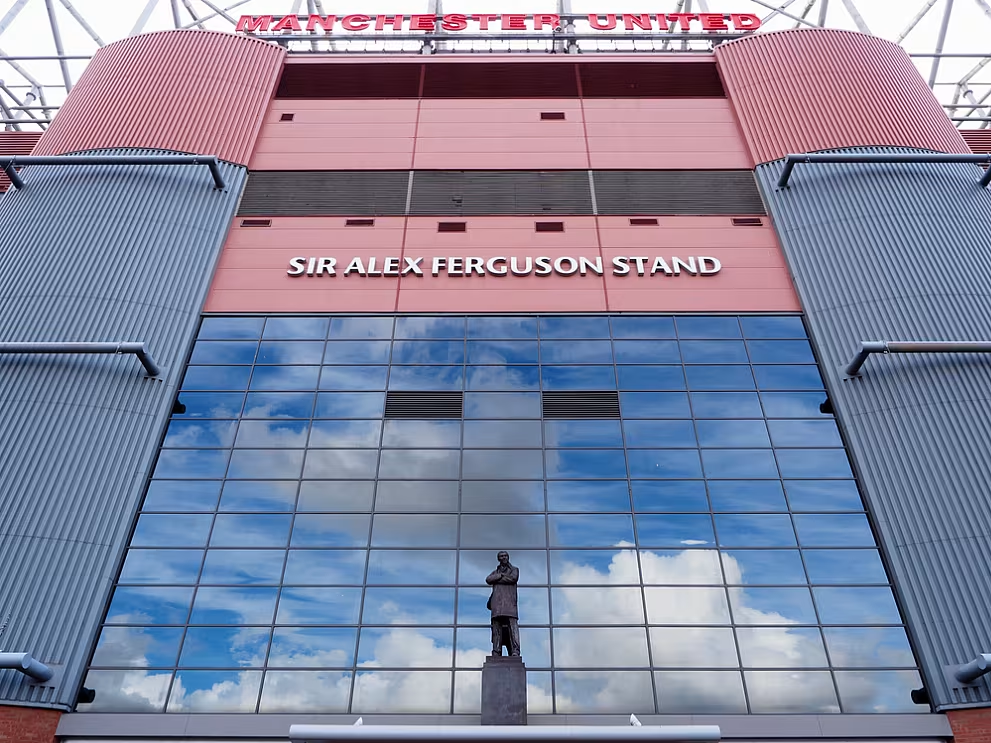
Statue of Alex Ferguson outside Old Trafford (Photo: Shutterstock)
There was to be a rude awakening. Though a very capable manager, Moyes appeared completely out of his depth at Old Trafford and, after a season that included historic home losses to Everton, Sunderland, and West Brom, they finished a dire seventh, left without European football for the following season.
Having finished inside the top three in every single Premier League season under Ferguson, United now found themselves outside the top four. Moyes was sacked in April and replaced on an interim basis by Ryan Giggs, who served as a player-manager in his final months with the club as a player.
For the 2014-15 season, Dutch manager Louis van Gaal took over the helm and, by the end of the season, he appeared to have restored the club to something resembling their expected performance. Impressive late season wins over Liverpool, Manchester City, and Tottenham Hotspur sealed fourth place in the league and a return to the Champions League for the following season.
It was, unfortunately for Manchester United, a false dawn. The 2015-16 season saw renewed struggles, as van Gaal found himself relying on youth. £60m 18-year-old Anthony Martial arrived in the 2015 summer transfer window and, alongside academy youngsters Jesse Lingard and Marcus Rashford, formed the core of a side that would stumble to sixth place in the league.
There was at least a first piece of silverware since Ferguson's departure, as goals from Juan Mata and Lingard in the final against Crystal Palace sealed a 12th FA Cup title for the club.
The final was followed almost immediately by news that van Gaal was to be sacked imminently. Sensationally, his replacement was to be the man who had toppled one of Ferguson's great United teams - former Chelsea boss Jose Mourinho.
Manchester United history: Mourinho, Solskjaer, and the descent into chaos
Mourinho was joined in arriving at Manchester United in the summer of 2016 by superstars Zlatan Ibrahimovic and Paul Pogba. Pogba had come through the United academy and departed on a free transfer to Juventus in 2012 - he re-signed for the club for £100m in 2016.
A new look United team was contending for a return to the Champions League and to continue the push for silverware that had finally come through in van Gaal's final game in charge.

Zlatan Ibrahimovic in action for Manchester United in the 2016-17 Europa League (Photo: Shutterstock)
They ticked both objectives off the list in the 2016-17 season. Goals from Ibrahimovic and Lingard won United the 2017 League Cup final against Southampton.
Meanwhile, goals from Pogba and Henrikh Mkhitaryan in the final against Ajax would win the club the Europa League for the first ever time. The Europa League win put United into the Champions League group stages for the following season. More importantly, it came mere days after the tragic bombing of a concert in Manchester, providing a moment of unity for the city in a time of darkness.
The following season would see United achieve both their highest points tally of the post-Ferguson era, as well as their highest finish in the league. They won 81 points and finished in second place - though they were a distant 19 points behind rivals Manchester City.
There was trouble behind the scenes however, as the atmosphere at the club began to turn sour under Mourinho. The beginning of the following season saw shocking losses to Tottenham, Brighton, and West Ham, and a 3-1 loss away to Liverpool in December left United in a distant sixth in the table - and saw Mourinho sacked.
He was replaced - initially on an interim basis - by club legend Ole Gunnar Solskjaer, then manager of Molde. Solskjaer oversaw an initial upturn in form, the highlight of which was a stunning comeback win against PSG in the Champions League last 16.
United would ultimately slip in form and finish outside of the Champions League places once more, taking sixth place in the league. Solskjaer was nonetheless rewarded with a permanent contract and the following season he led United to a third place finish in the league and the semi-finals of both cup competitions and the Europa League. The arrival of Portuguese playmaker Bruno Fernandes midway through the season was crucial to the club's success.
The COVID-delayed 2020-21 season was to be United's most successful under Solskjaer, as they sealed second place in the league. Fernandes once again starred alongside Marcus Rashford and Uruguayan forward Edinson Cavani as United impressed with their league form.
The season was marked by persistent protests against the club's owners, the Glazer family. Issue was raised with the financing of the club and the controversial "European Super League" plans which the Glazers had been part of. The season was also to have a disappointing end, as United were defeated by Villarreal on penalties in a shock result in the Europa League final.

Manchester United fans protest against the Glazer ownership in April 2021
Manchester United history: Erik Ten Hag, the return of Ronaldo, and a new era?
The summer of 2021 brought huge promise, as Manchester United signed four-time Champions League winner and World Cup winner Raphael Varane from Real Madrid, and long-term target Jadon Sancho from Borussia Dortmund.
Most exciting for fans, however, was the sensational return of one of the greatest Manchester United players on a two-year deal from Juventus, as 36-year-old Cristiano Ronaldo returned to Old Trafford.

Cristiano Ronaldo celebrates with Marcus Rashford after scoring against Villarreal in the Champions League (Photo: Shutterstock)
Despite some heroic moments from Ronaldo and memorable wins in the Champions League group stage, this was to be United's worst season post-Ferguson, and they once again finished in sixth place, and exited the FA Cup, League Cup, and Champions League early on. The poor form led to the sacking of Solskjaer in November, in the aftermath of a shocking 5-0 home defeat to Liverpool. The Norwegian left the club after three years without a trophy.
German manager Ralf Rangnick took over until the end of the season, and will be replaced by Erik Ten Hag for the 2022-23 season. A new era beckons for Manchester United - but a major challenge is ahead to return the club to the lofty heights they reached so consistently under Alex Ferguson.
Manchester United stats 1992-2022
- 13 Premier League titles (1992-93, 1993-94, 1995-96, 1996-97, 1998-99, 1999-2000, 2000-01, 2002-03, 2006-07, 2007-08, 2008-09, 2010-11, 2012-13)
- Six FA Cup titles (1989-90, 1993-94, 1995-96, 1998-99, 2003-04, 2015-16)
- Four League Cup titles (2005-06, 2008-09, 2009-10, 2016-17)
- Two Champions League titles (1998-99, 2008-09)
- One Europa League title (2016-17)
- One FIFA Club World Cup title (2008)


